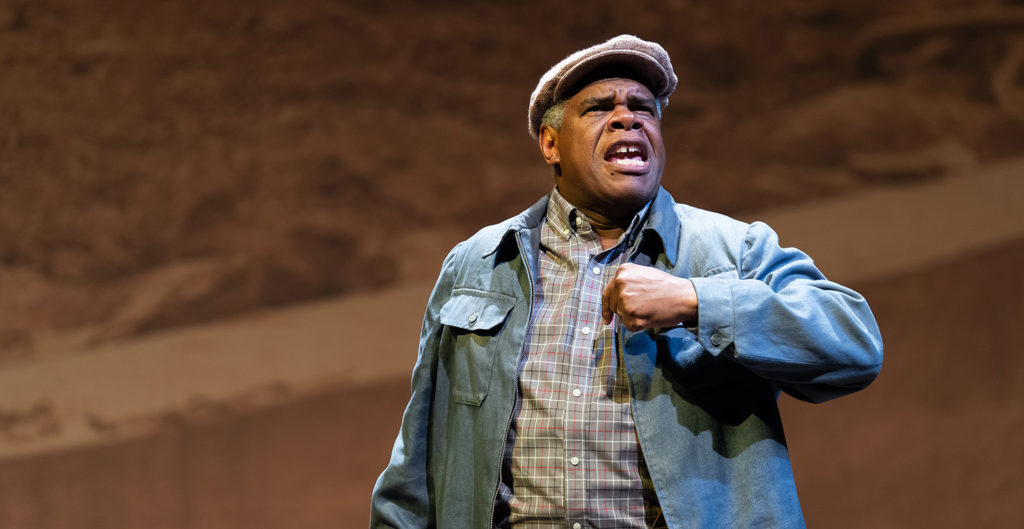Culture
 Photo: Scott Suchman
Photo: Scott Suchman
Ford’s Theater Brings August Wilson’s Masterpiece to Life with Fences
October 4, 2019 @ 12:00am
By the end of Fences, August Wilson’s Pulitzer Prize-winning masterpiece now playing at Ford’s Theatre, we know a lot about Troy Maxson: his hard-scrabble Southern childhood, his stint in jail, and his time as a star in baseball’s Negro Leagues. We know that he is a liar, a cheater and sometimes, a thief. We know that he is consumed by bitterness and convinced that life didn’t give him a fair shake.
But what we don’t know is whether or not we like him.
Audiences will find him captivating and hang on his every word of this brilliantly penned play. And just like Troy’s wife Rose, whose years of loyalty Troy spits on with one selfish act, or Troy’s son Cory, whose life Troy derails before it has really started, it’s easy to be drawn into Troy’s orbit, despite its ruinous impact.
Troy Maxson is one of American theater’s great tragic heroes. The success of any production of Fences hinges on finding the right actor to tell the story of this former baseball star who now scrapes by as a sanitation worker in segregated 1950s Pittsburgh. In Ford’s production, Craig Wallace proves himself the ideal performer to fit the role.
As Troy, Wallace portrays a complicated man who holds us spellbound for the nearly three hours he is onstage, entrancing us with every story and monologue. This performance is a crowning achievement in Wallace’s already long and successful career.
Wallace is joined onstage by six other consummate actors as Troy’s friends and family. With director Timothy Douglas (who has directed nine out of the ten plays in August Wilson’s Century Cycle, documenting African American life in each decade of the 20th century), they breathe glorious life into what is some of the most beautiful and natural dialogue ever written by an American playwright.
Erika Rose shines as Rose Maxson, Troy’s wife of 18 years, who grows throughout the play, eventually becoming a hero in her own right. Rose conveys a simmering intensity; when confronted with the truth of her husband’s betrayal, she gives her own share of masterful monologues that are a joy to watch.
Justin Weeks burns as Troy’s youngest son Cory, who grows from frustrated teen to responsible adult before our very eyes. Doug Brown (as Jim Bono), KenYatta Rogers (as Lyons Maxson), Jefferson A. Russell (as Gabriel Maxson), and the two young girls who alternate the role of Raynell Maxson (Janiyah Lucas and Mecca Rogers) all contribute to the production’s success.
Part of the joy – and the sorrow – of Fences lies in watching these characters interact with Troy, at first merely satellites, trapped in his orbit but eventually, finding the strength to launch out on their own, as they retreat from the corrosive effects of his self-destruction and forge their own destinies.
If you haven’t seen Fences before, this production is a great introduction to the genius of Wilson. If you are a seasoned Wilson vet, you will find that Ford’s iteration successfully taps into the pure beauty of Wilson’s work. Through Douglas’s direction, Wilson’s dialogue is so natural, so endearing, his characters so consistently fleshed out, that you immediately feel a kinship with the characters onstage.
Though his character’s lives may be drastically different than yours (and in my case, they are), Wilson’s genius lies in his ability to tap into the universal humanity in us all. The fact that he did so through the lens of African American life that had – until his arrival – been deplorably absent from American stages, makes his accomplishments as a playwright one of the most important in the history of American theater.
Lauren Helpern’s scenic design features a two-story projection of 1950s Hill District Pittsburgh that feels almost too dilapidated and dystopian but, set against the cozy brownstone in which the Maxsons live, clearly drives home the point that Rose – and Troy – worked painstakingly over many years to forge a comfortable home. The soft touches of a flowered curtain poking out of the kitchen window or the shadow of a lone tree falling on the brick rowhouse (lighting by Andrew R. Cissna) hint at Rose’s grit and dedication to her family.
And then, of course, there’s the fence. Troy has been building it throughout the show at Rose’s request. “Some people build fences to keep people out, other people build fences to keep people in,” Troy’s friend Bono tells him near the end of the play.
And that’s one of the great gifts that Ford’s Theatre’s production of Fences offers audiences: The opportunity to reflect on how we, as individuals, react to adversity.
We don’t need to like Troy Maxson, but witnessing his story allows us to ponder his choices and the choices we all face as humans.
August Wilson’s Fences runs at Ford’s Theatre through October 27. Various dates, times and prices. Run time is three hours including one fifteen-minute intermission.
Ford’s Theatre: 511 10th St. NW, DC; 202-347-4833; www.fords.org







